
Funk is a music genre that originated in African-American communities in the mid-1960s when musicians created a rhythmic, danceable new form of music through a mixture of various music genres that were popular among African-Americans in the mid-20th century. It deemphasizes melody and chord progressions and focuses on a strong rhythmic groove of a bassline played by an electric bassist and a drum part played by a percussionist, often at slower tempos than other popular music. Funk typically consists of a complex percussive groove with rhythm instruments playing interlocking grooves that create a "hypnotic" and "danceable" feel. It uses the same richly colored extended chords found in bebop jazz, such as minor chords with added sevenths and elevenths, and dominant seventh chords with altered ninths and thirteenths.

The Meters are an American funk band formed in 1965 in New Orleans by Zigaboo Modeliste (drums), George Porter Jr. (bass), Leo Nocentelli (guitar) and Art Neville (keyboards). The band performed and recorded their own music from the late 1960s until 1977 and played an influential role as backing musicians for other artists, including Lee Dorsey, Robert Palmer, Dr. John, and Allen Toussaint. Their original songs "Cissy Strut" and "Look-Ka Py Py" are considered funk classics.

Fred Wesley is an American trombonist who worked with James Brown in the 1960s and 1970s, and Parliament-Funkadelic in the second half of the 1970s.
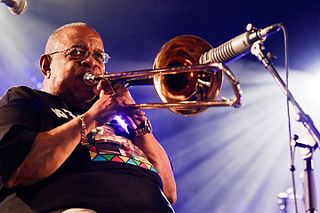
The J.B.'s was James Brown's band from 1970 through the early 1980s. On records, the band was sometimes billed under alternate names such as Fred Wesley and the JBs, The James Brown Soul Train, Maceo and the Macks, A.A.B.B., Fred Wesley and the New JBs, The First Family, and The Last Word. In addition to backing Brown, the J.B.'s played behind Bobby Byrd, Lyn Collins, and other singers associated with the James Brown Revue, and performed and recorded as a self-contained group. In 2015, they were nominated for induction into the Rock and Roll Hall of Fame but failed to be inducted and can be considered for Musical Excellence in the future. They have been eligible since 1995.

The Rebirth Brass Band is a New Orleans brass band. The group was founded in 1983 by Phillip "Tuba Phil" Frazier, his brother Keith Frazier, Kermit Ruffins, and classmates from Joseph S. Clark Senior High School, which closed in the spring of 2018, in the Tremé neighborhood of New Orleans. Arhoolie released its first album in 1984.
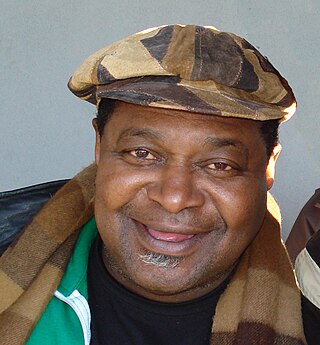
Alfred James Rogers, known as Pee Wee Ellis due to his diminutive stature, was an American saxophonist, composer, and arranger. With a background in jazz, he was a member of James Brown's band in the 1960s, appearing on many of Brown's recordings and co-writing hits like "Cold Sweat" and "Say It Loud – I'm Black and I'm Proud". He also worked with Van Morrison. Ellis resided in England for the last 30 years of his life.
"Cold Sweat" is a song performed by James Brown and written with his bandleader Alfred "Pee Wee" Ellis. Brown recorded it in May 1967. An edited version of "Cold Sweat" released as a two-part single on King Records was a No. 1 R&B hit, and reached number seven on the Pop Singles chart. The complete recording, more than seven minutes long, was included on an album of the same name.
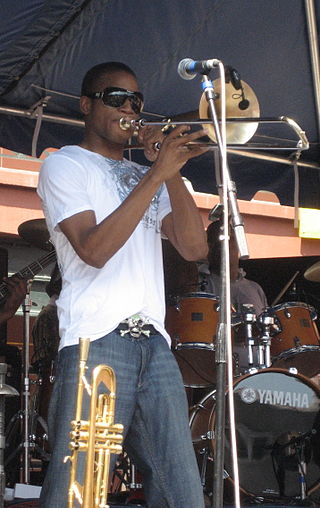
Troy Andrews, also known by the stage name Trombone Shorty, is a musician, most notably a trombone player, from New Orleans, Louisiana. His music fuses rock, pop, jazz, funk, and hip hop.

"Mother Popcorn (You Got to Have a Mother for Me)" is a song recorded by James Brown and released as a two-part single in 1969. A #1 R&B and #11 Pop hit, it was the highest-charting of a series of recordings inspired by the popular dance the Popcorn which Brown made that year, including "The Popcorn", "Lowdown Popcorn", and "Let a Man Come In and Do the Popcorn". The "mother" of the song's title was, in the words of biographer RJ Smith, "[Brown's] honorific for a big butt".
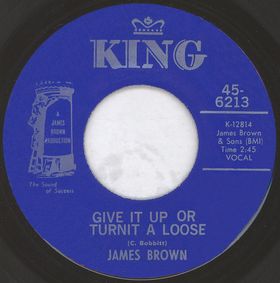
"Give It Up or Turnit a Loose" is a funk song recorded by James Brown. Released as a single in 1969, the song was a #1 R&B hit and also made the top 20 pop singles chart. "Give It Up or Turnit a Loose" appeared as an instrumental on the Ain't It Funky (1970) album, removing Brown's vocals and adding guitar overdubs, while the vocal version was released on It's a New Day – Let a Man Come In (1970).

Leo Nocentelli is an American musician and songwriter best known as a founding member and lead guitarist of the funk band the Meters. He wrote the original versions of several funk classics such as "Cissy Strut" and "Hey Pocky A-Way". As a session musician he has recorded with a variety of notable artists such as Dr. John, Robert Palmer and Etta James. He is the recipient of a Grammy Lifetime Achievement Award as a member of the Meters.

Blacktronic Science is the third solo album by the former Parliament-Funkadelic keyboardist Bernie Worrell. The album was released by Gramavision Records in 1993.

The Third Power is a 1991 album by the New York based music group Material. The album mixes reggae, funk, dub and rap music.
Dixieland jazz, also referred to as traditional jazz, hot jazz, or simply Dixieland, is a style of jazz based on the music that developed in New Orleans at the start of the 20th century. The 1917 recordings by the Original Dixieland Jass Band fostered awareness of this new style of music.
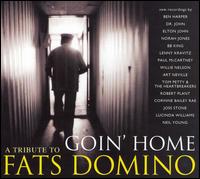
Goin' Home: A Tribute to Fats Domino is a 2007 tribute album by various artists to Fats Domino, issued by Vanguard Records. Most of the songs were written by Domino and Dave Bartholomew.
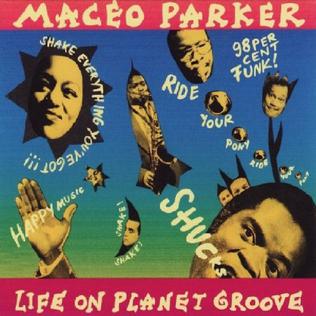
Life on Planet Groove is a live album by Maceo Parker, released in 1992. It was recorded in concert at the club Stadtgarten in Cologne, Germany.

Mo'Roots is an album by the American saxophonist Maceo Parker, released in 1991. It peaked at No. 4 on Billboard's Traditional Jazz Albums chart.
"The Chicken" or simply "Chicken" is an instrumental funk tune composed by Pee Wee Ellis that was the B-side to James Brown's 1969 single "The Popcorn". The tune gained greater exposure with versions by jazz bassist Jaco Pastorius.

Funk Overload is an album by Maceo Parker, released in 1998 via What Are Records? and Cream Records.

Roots Revisited is an album by saxophonist Maceo Parker which was originally released on the Minor Music label in 1990.

















